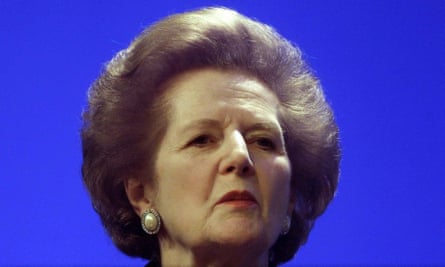What could be more exquisitely Thatcheresque than Theresa May’s promise to be “a bloody difficult woman” during upcoming Brexit negotiations? The phrase is a downmarket version of the iron lady soubriquet so gleefully embraced by Britain’s first female prime minister. They both tap into an archetype with deep roots in the national mythology: the warrior queen who defiantly defends these islands from hostile foreigners – Boudicca, Elizabeth I, Victoria, Britannia herself.
But it also relies on the same political jujitsu performed by Thatcher. For “iron lady” was, like “bloody difficult woman”, a compliment that began as an insult. It was coined by a Russian military journalist writing for the Red Star newspaper in 1979 and was not meant kindly. But Thatcher seized on it and wore it with pride. Similarly, it was arch-Europhile Ken Clarke who was overheard last year calling his former cabinet colleague “a bloody difficult woman” and May wasted no time in repeating those words as praise.
Now she’s turning them against Clarke’s kindred spirits in Brussels, implicitly casting both Clarke and European commission president Jean-Claude Juncker as part of a single, pro-European establishment that she is determined to confront. Indeed, it reflects what is an emerging pattern in the current, pre-talks skirmishes between London and Brussels: May takes an EU dart aimed to wound her and turns it to her immediate advantage.
Consider the tough noises Brussels is repeatedly making about its approach to the upcoming Brexit negotiations. Just today, the EU’s chief negotiator, Michel Barnier, warned the UK that it is an “illusion” to think these talks can be conducted “quickly and painlessly” and to imagine that Brexit will have “no material impact”. That came after a report in today’s Financial Times suggesting that the divorce bill could approach €100bn, which itself followed a leaked account of a Downing Street dinner in which Juncker reportedly told May he left feeling “10 times more sceptical” about the possibility of reaching a deal.

If this show of Brussels implacability is meant to weaken May or shake Britons’ commitment to Brexit, its short-term fate is likely to be failure on both counts. For it plays perfectly into the “strong and stable leadership” pitch May is making in the current election campaign. The tougher Brussels seems, the more the moment appears to call for a corresponding toughness in Downing Street – a quality that, despite her repeated U-turns, May has managed to persuade voters she embodies.
Nor is it likely to cause any short-term erosion in the country’s support for Brexit. On the contrary, with each new, increased or apparently unfair demand, the EU makes it likelier that British opinion hardens, leading plenty of voters to conclude that, when it comes to the EU, “we’re better off out of it”.
But the key words here are “short-term”. For now, these darts aimed at May hurt Brussels in the eyes of Britons more than they hurt her. But as negotiations unfold over the next two years, as Britons see the truth in what Barnier said today – that it is indeed an illusion to imagine that the UK can emerge from this process unharmed – opinion will surely shift. Because it is a matter of hard logic that the EU cannot possibly allow Brexit to leave the UK in the same or a better position than it was before. It has to send a message to the peoples of the remaining 27 states that to exit the EU is to court economic disaster. They need Brexit to be not an encouragement to others, but a warning.
May might get good headlines out of this stand-off with Brussels, playing Thatcher the second, but the reality will soon become clear. As the novelist Robert Harris so rightly noted, for centuries British foreign policy has had a key goal: to avoid “Europe becoming a single bloc united against us”. Yet that’s exactly what’s now happened. At the weekend, the EU 27 took just four minutes to approve their common stance against the UK.
The poor EU countries don’t want to miss out on the cash they currently receive from our contributions; the rich ones don’t want to have to pay our share of the bill. Their unity is total. So May can enjoy posing as a “bloody difficult woman” and it may well bring her success on 8 June. But after that she will enter a process so complex and so damaging, that “bloody difficult” will be putting it mildly.
